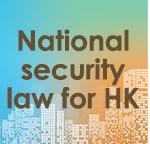The so-called Hong Kong Autonomy Law that President Donald Trump approved on Tuesday is nothing but the latest testimony to Washington's ill intention to sabotage the newly introduced national security law for the city and encourage its pawns there to continuously make trouble.
The law provides for the imposition of sanctions on foreign persons, including organizations, who materially contribute to "the undermining of Hong Kong's autonomy", and foreign financial institutions, which engage in significant transactions with such foreign persons.
And since, at the same time he signed the legislation, the US president also signed an executive order that "blocks" the US property of any person determined to be responsible for or complicit in "actions or policies that undermine democratic processes or institutions in Hong Kong", is he relinquishing all his property interests?
So are US lawmakers going to sanction themselves and the US administration? By prescribing Hong Kong's autonomy, they are materially contributing to undermining it.
READ MORE: Watershed in HK's history
His administration has no qualms about openly endorsing the subversive and secessionist-minded radicals in Hong Kong who are seeking to undermine the democratic processes and institutions in the city established under the basic law and "one country, two systems" framework. So, no more golf at Mar-a-Lago?
Given the broad scope of participants that it entails to safeguard national security in the city, not to mention the international financial center's wide connections with financial institutions around the world, the US legislation technically grants the US administration the legal power to intimidate all of them with sanctions.
Washington can brazenly use the law as a stick to coerce any parties that it says are directly or even indirectly engaged in normal business, academic and cultural exchanges with the SAR
In other words, Washington can brazenly use the law as a stick to coerce any parties that it says are directly or even indirectly engaged in normal business, academic and cultural exchanges with the SAR. In doing so, it is also nullifying what the US president said was "a very, very serious competitor".
ALSO READ: National security office signifies a new era for HK
The executive order also ends Hong Kong's "preferential treatment", which means the US will no longer treat Hong Kong separately from the Chinese mainland on matters concerning trade, exports, finance and economy, which the US president claimed meant "no special privileges, no special economic treatment, and no export of sensitive technologies", so no more "taking us to the cleaners".
But that only serves to show that the legislation, executive order and the accompanying rhetoric have nothing to do with Hong Kong per se. They are about China. Specifically as a campaign message: "Joe Biden and President Obama freely allowed China to pillage our factories, plunder our communities, and steal our most precious secrets."
And since its trade surplus with Hong Kong is about US$30 billion each year, making the city the US' largest trade surplus contributor, the effects will be more palpable to the US than Hong Kong, whose separate customs territory status is based on the rules of the World Trade Organization, rather than being bestowed as a favor by the US. Not to mention that given past practice, China will likely respond to the US' overbearing moves with countermeasures.



